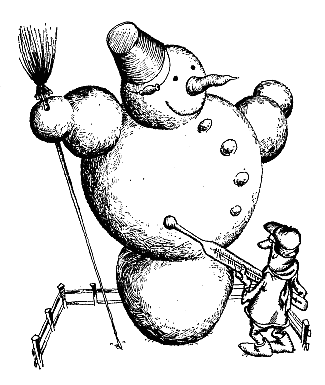107Stories About ChemistryINDEX |
15.
So Simple And Yet So Wonderful
Before the war there was a merry comedy on at the movies, called �Volga, Volga.� In it a blithe water carrier sings as he whips up his lazy horses: �For water�s needed everywhere: Without�t you�re neither here nor there �� The song was a great success and has now even become proverbial. But this simple ditty holds profound implications. For water really is substance No. 1 in life. H2O. One atom of oxygen plus two atoms of hydrogen. Probably one of the first chemical formulas you ever learn. Now try to imagine what would become of our planet if the water suddenly disappeared from it. Dismal yawning �cavities� of sea and ocean hollows covered with a thick layer of the salt once dissolved in the water. Dry river channels, springs which will never bubble again. Rocks disintegrated to ash: water was one of their main constituents. Neither bush nor flower, not a living thing on the dead Earth. And above it a cloudless sky of a horrifying unusual colour. So simple a compound, and yet where there is no water, no life, intelligent or unintelligent, is possible. Why? First of all because water is the most remarkable chemical compound in the world.  When Celsius invented his thermometer, he based his device on two values, or two constants: the boiling point and the freezing point of water. He took the former as equal to 100�, and the second to zero. Then he divided the interval between them into 100 divisions. Thus appeared the first instrument for measuring temperatures. But what would Celsius have thought if he knew that actually water should not freeze at all at zero nor boil at 100 degrees? Nowadays scientists have established that in this respect water is a great fraud. It is the most anomalous compound on the globe. Here is what scientists claim: water should boil at a temperature 180� lower, i.e. at minus 80 degrees. At any rate, the regulations current in the Periodic System would have it boil at such an antarctic temperature. The properties of the elements of anyone group of the Periodic System gradate quite regularly from the light elements to the heavy ones. Take, for instance, the boiling point. The properties of compounds do not vary just any old way, but depend on the location of the elements, comprising the molecule, in the Mendeleyev Table. This refers in particular, to hydrogen compounds, to hydrides of elements of the same group. Water may be called oxygen hydride. Oxygen is a member of the sixth group, which also includes sulphur, selenium, tellurium, and polonium. The hydrides of all these elements have the same molecular pattern as the water molecule: H2S, H2Se, H2Te, and H2Po. The boiling points of these compounds are known to gradate regularly from sulphur to its heavier brothers. And unexpectedly we find that the boiling point of water falls out of this series, being much higher than it should be. Water refuses to acknowledge the rules of behaviour established for the Periodic Table, as it were, and postpones its transition to the vapour state for 180 degrees. This is only the first amazing anomaly of water. Its second anomaly has to do with its freezing point. The laws of the Periodic System specify that water shall solidify at a temperature of 100 degrees below zero. Water violates this requirement harshly and turns to ice at zero. This wilfulness of water suggests that its liquid and solid states are abnormal on Earth. According to the rules water should exist here only in the vapour form. Now imagine a world where the properties of water obey the strict regularities of the Periodic System. For fiction writers such a unique picture would be an excellent basis for thinking up amusing novels and stories. But for us, and for scientists, it is further evidence that the Periodic Table is a much more complex structure than it seems at first glance and that the characters of its inhabitants very greatly resemble those of live people in that they cannot be confined to definite bounds. Water is of a wilful character� But why? Because the molecules of water have a specific arrangement and for this reason possess a pronounced ability to attract one another. In vain would we look for single molecules in a glass of water. The molecules form groups which scientists call associations. And it would be more correct to write the formula of water as (H2O)n , the subscript n indicating the number of molecules in the association. These associative bonds between the water molecules are very difficult to break. And that is why water freezes and boils at much higher temperatures than would be expected. |





